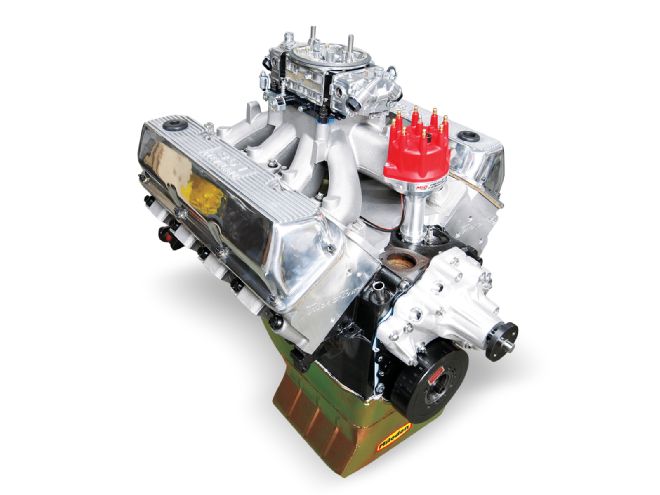
Previously we brought you the details on the 408ci stroker bottom end of our true Ford Cleveland build in our February issue, but in this second installment you'll see the magic that will make it a fire breather fit for any fast Ford.
The real stars of this show are the new Trick Flow Specialties PowerPort 225cc Cleveland heads and Track Heat intake. The heads are a big breakthrough, but they aren't a ground-up redesign—they weren't intended to be. What they are is a very thorough revision of the Cleveland architecture that takes into account modern cylinder head chamber and port design gleaned from Trick Flow's extensive racing background and integrates that into in a package that will bolt right onto any Cleveland (or Windsor, with minor mods) Ford small-block, work with other stock-style parts, and create a much improved peak and average power curves.
Also available in 195cc versions, the heads feature intake and exhaust runners based on the low-rpm friendly OE Ford 2V design, but the exhaust runners are raised .100-inch from the OE 2V location to improve the short-turn radius, resulting in dramatically improved exhaust flow. The combustion chambers are fully CNC-profiled and bowl-blended to further maximize performance. In the lubrication department, the oil return system on the Trick Flow heads has been revised to improve oil drainback and also includes provisions for easily mating them with 351 Windsor blocks.
While we're quite sure the FoMoCo muscle car crowd with cars originally powered by Clevelands will be the core base drooling over these heads, it's definitely worth noting that the PowerPort heads also fit 351M, and 400 engines out of the box. That means a new lease on life for a plethora of 1970s cars, and boatloads of trucks. With minor machining and some Ford blue paint, the heads can even be used with 302 and 351W blocks to create "replica" Boss 302 or 351 engines that pack a bigger punch. Let that sink in and stir your imagination a bit.
Enough bench racing, check out exactly what is possible with a very simple and street-oriented Cleveland engine built from a bevy of well-chosen parts sourced exclusively from Trick Flow and Summit Racing by a knowledgeable shop like Ford Performance Solutions.
By The Numbers • 408ci Cleveland Block: 1970 vintage 351 Ford Cleveland Bore & stroke: 4.030 x 4.00 Crank: Scat stroker kit from Summit Racing Rods: Scat 6.200 H-beam Pistons: Scat forged aluminum Rings: Scat file-fit Bearings: MAHLE/Clevite Balancer: ATI Super Dampner Timing set: COMP Cams double-roller Oil pan: Milodon Oil pump: Melling high-volume, Milodon pickup Cylinder heads: Trick Flow Specialties PowerPort Cleveland 225cc Rocker arms: COMP Cams 1.72 ratio Ultra Gold Intake: Trick Flow Specialties Track Heat Cleveland Gaskets: Fel-Pro throughout, Fel-Pro PermaTorque MLS head gaskets Bolts/studs: ARP throughout, ARP stainless bolt kit from Summit Racing Cam: COMP Cams hydraulic roller, .612/.612 lift, 245/245 duration at .050, 110 LSA Lifters: COMP Cams hydraulic roller conversion kit Pushrods: Trick Flow Specialties Distributor: MSD Pro-Billet Plug wires: MSD Super Conductor Valve covers: Ford Racing
On The Dyno 408ci Cleveland RPM: TQ: HP: 3,600 499 342 3,800 496 359 4,000 496 378 4,200 499 399 4,400 508 426 4,600 516 452 4,800 519 474 5,000 520 495 5,200 522 517 5,400 523 538 5,600 522 557 5,800 521 575 6,000 517 591 6,200 514 607 6,400 510 621
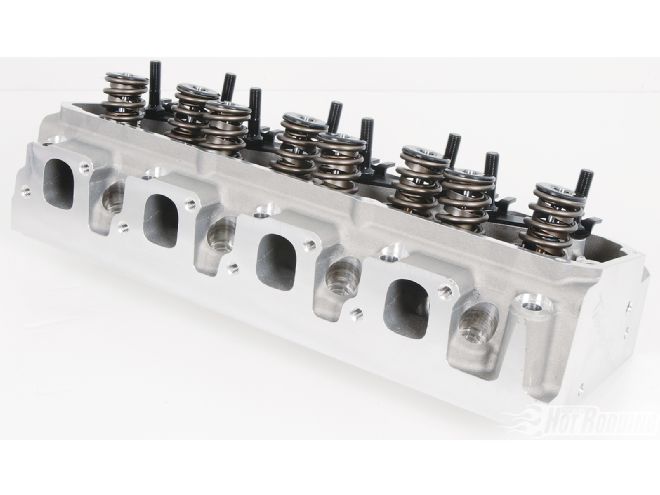 1. Without further ado, these are the Trick Flow PowerPort Cleveland 225 heads (TFS-5161T004-C01, $1,299.99). They feature fully CNC-ported 225cc intake and 115cc exhaust runners and 60cc combustion chambers, and are designed to bridge the gap between the high-rpm slanted Ford 4V heads and the more pedestrian low-rpm 2V heads. They are available bare, or fully assembled like ours.
1. Without further ado, these are the Trick Flow PowerPort Cleveland 225 heads (TFS-5161T004-C01, $1,299.99). They feature fully CNC-ported 225cc intake and 115cc exhaust runners and 60cc combustion chambers, and are designed to bridge the gap between the high-rpm slanted Ford 4V heads and the more pedestrian low-rpm 2V heads. They are available bare, or fully assembled like ours.
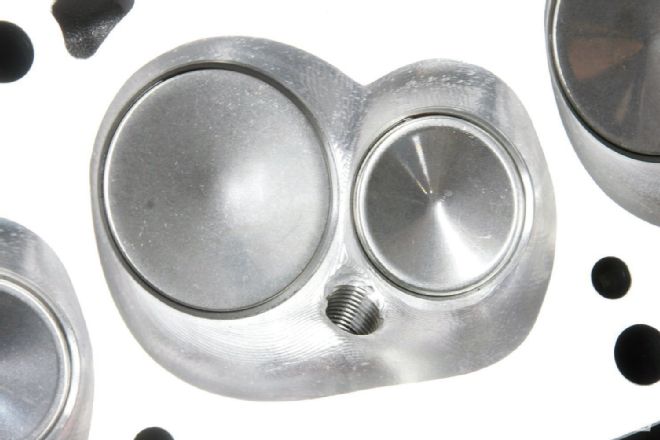 2. Original Cleveland 2V heads featured 2.04 intake/1.77 exhaust valves (larger than the ones used on the 428FE big-blocks), and the 4V had even bigger ones at 2.19 intake and 1.71 exhaust. Inside the uniquely designed Trick Flow PowerPort combustion chamber (available in either 60cc like ours, or 72cc), lightweight stainless steel valves measure 2.080/1.600 and use ductile iron valve seats.
2. Original Cleveland 2V heads featured 2.04 intake/1.77 exhaust valves (larger than the ones used on the 428FE big-blocks), and the 4V had even bigger ones at 2.19 intake and 1.71 exhaust. Inside the uniquely designed Trick Flow PowerPort combustion chamber (available in either 60cc like ours, or 72cc), lightweight stainless steel valves measure 2.080/1.600 and use ductile iron valve seats.
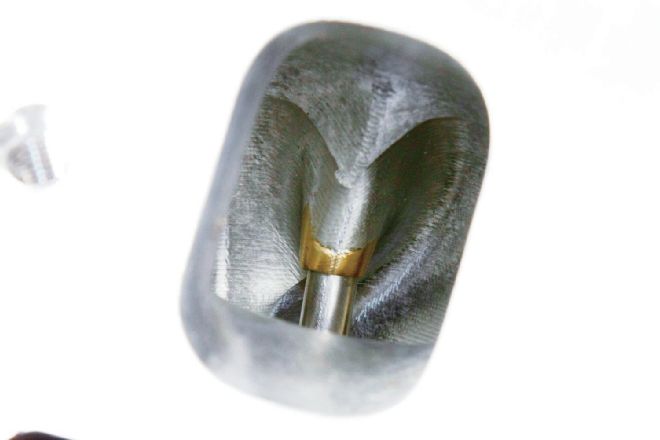 3. Original 2V Cleveland heads had small ports, while the 4V had massive 2.5x1.75-inch intake ports that you could just about get your whole hand into. The Trick Flow PowerPort measures out at 2.19 x 1.485 with a 1.85-inch throat diameter on the intake, and 1.470 x 1.540 with a 1.40-inch throat diameter on the exhaust. Also note the excellent CNC machine work around the valve boss.
3. Original 2V Cleveland heads had small ports, while the 4V had massive 2.5x1.75-inch intake ports that you could just about get your whole hand into. The Trick Flow PowerPort measures out at 2.19 x 1.485 with a 1.85-inch throat diameter on the intake, and 1.470 x 1.540 with a 1.40-inch throat diameter on the exhaust. Also note the excellent CNC machine work around the valve boss.
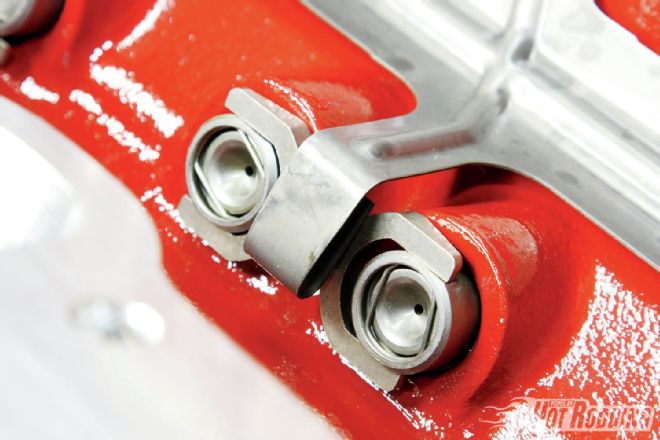 6. Since we went with a COMP Cams hydraulic roller conversion for this build, roller lifters are held from spinning in their bores by these dog bone–style links while the bracket keeps tension on them. These kits are affordable and available for many vintage engines now.
6. Since we went with a COMP Cams hydraulic roller conversion for this build, roller lifters are held from spinning in their bores by these dog bone–style links while the bracket keeps tension on them. These kits are affordable and available for many vintage engines now.
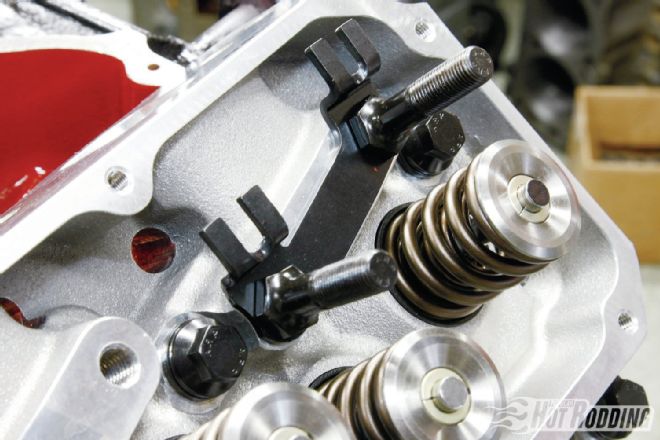 4. The heads also include 7/16-inch ARP rocker arm studs, and your choice of 1.460-inch (.650-inch max valve lift) or 1.530-inch (.680-inch max lift) dual valvespring packages, as well as chromoly retainers, machined valve locks, and Viton fluoroelastomer valve seals. Our COMP Cams hydraulic roller (grind 304RF-HR10) specs out at .612/.612 lift and 245/245 duration at .050 with a 110 LSA, so we’re well within the safe range.
4. The heads also include 7/16-inch ARP rocker arm studs, and your choice of 1.460-inch (.650-inch max valve lift) or 1.530-inch (.680-inch max lift) dual valvespring packages, as well as chromoly retainers, machined valve locks, and Viton fluoroelastomer valve seals. Our COMP Cams hydraulic roller (grind 304RF-HR10) specs out at .612/.612 lift and 245/245 duration at .050 with a 110 LSA, so we’re well within the safe range.
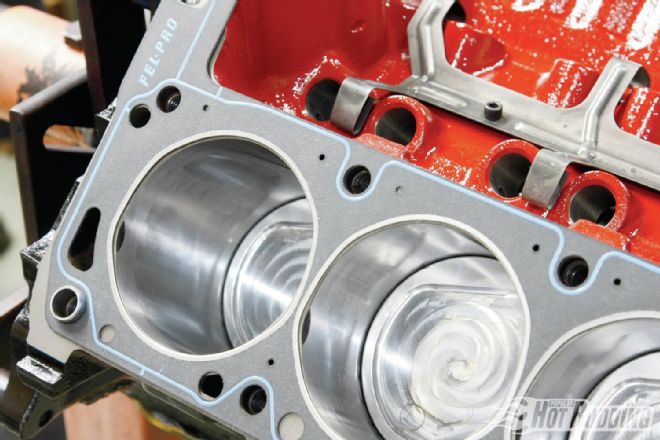 5. Per usual, we’re using Fel-Pro head gaskets to ensure an excellent seal to the block. Paired with the 16cc dished Scat forged pistons that sit .010 below the deck, we’ll have .060 total combustion chamber volume with the .050 Fel-Pro gaskets.
5. Per usual, we’re using Fel-Pro head gaskets to ensure an excellent seal to the block. Paired with the 16cc dished Scat forged pistons that sit .010 below the deck, we’ll have .060 total combustion chamber volume with the .050 Fel-Pro gaskets.
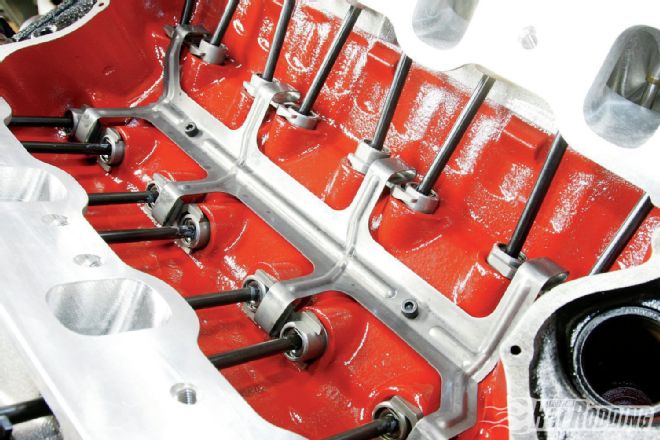 6. After mock-up and measurement, our pushrod length came in at 8.100 inches. We went with Trick Flow’s own 4130 chromoly steel, 5/16-inch diameter pushrods since they have a great price and feature a .080-inch wall thickness. They’re also heat-treated for use with guideplates, and the oiling holes are drilled and chamfered to .093 inch to prevent stress fractures and cracks.
6. After mock-up and measurement, our pushrod length came in at 8.100 inches. We went with Trick Flow’s own 4130 chromoly steel, 5/16-inch diameter pushrods since they have a great price and feature a .080-inch wall thickness. They’re also heat-treated for use with guideplates, and the oiling holes are drilled and chamfered to .093 inch to prevent stress fractures and cracks.
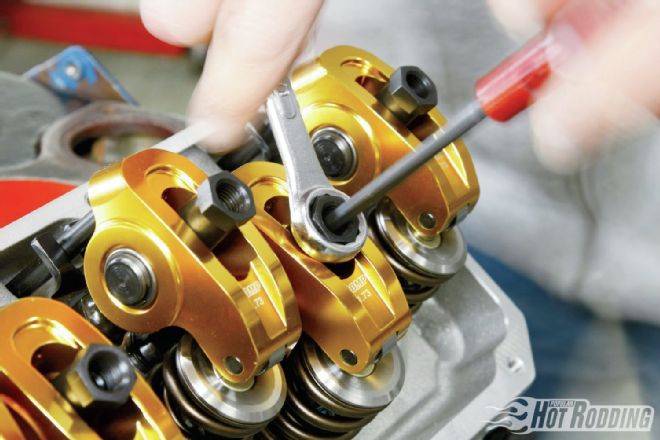 7. For rockers we went with COMP Cams’ CNC-machined Ultra Gold aluminum rocker arms in stock 1.73 ratio (CCA-19045-16, $364.97) since they were designed specifically for high-performance and dual-purpose street/strip engines, which is exactly what we’re building.
7. For rockers we went with COMP Cams’ CNC-machined Ultra Gold aluminum rocker arms in stock 1.73 ratio (CCA-19045-16, $364.97) since they were designed specifically for high-performance and dual-purpose street/strip engines, which is exactly what we’re building.
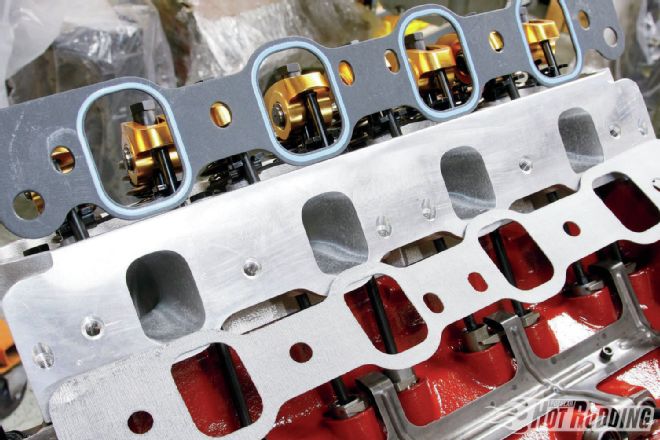 8. Here’s a perfect visual reference for the large difference in intake port size. The upper gasket is a Fel-Pro for a 4V Cleveland (2.5 x 1.75 port), the lower is the gasket provided by Trick Flow for the PowerPort heads (2.19 x 1.485 port).
8. Here’s a perfect visual reference for the large difference in intake port size. The upper gasket is a Fel-Pro for a 4V Cleveland (2.5 x 1.75 port), the lower is the gasket provided by Trick Flow for the PowerPort heads (2.19 x 1.485 port).
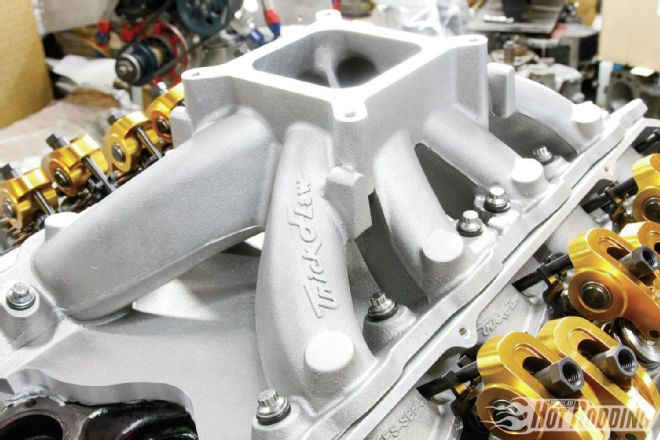 9. Paired with the PowerPort cylinder heads, we chose Trick Flow’s Track Heat single-plane intake (TFS-51600111, $399.97). Designed for significantly more power in the 3,000- to 7,000-rpm range, the intake uses OE 2V port locations and dimensions, a raised plenum floor for increased flow velocity and fuel atomization, integral bosses for nitrous or fuel injectors, and extra material for custom porting. Though they pair best with the TFS heads, the manifolds will work in all 2V and 4V Cleveland applications.
9. Paired with the PowerPort cylinder heads, we chose Trick Flow’s Track Heat single-plane intake (TFS-51600111, $399.97). Designed for significantly more power in the 3,000- to 7,000-rpm range, the intake uses OE 2V port locations and dimensions, a raised plenum floor for increased flow velocity and fuel atomization, integral bosses for nitrous or fuel injectors, and extra material for custom porting. Though they pair best with the TFS heads, the manifolds will work in all 2V and 4V Cleveland applications.
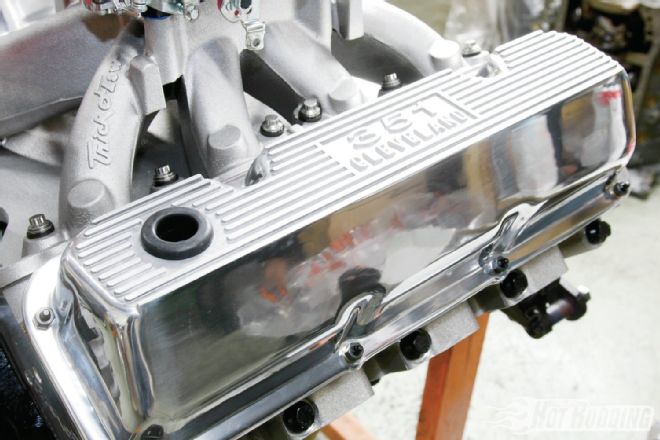 10. With all that gorgeous aluminum from Trick Flow, we couldn’t bear to put the factory stamped steel valve covers back on! These finned Ford Racing covers from Summit Racing (FMS-M6582C351PD, $163.97) mimic the traditional Shelby Cobra style and are some of the best looking Cleveland parts available.
10. With all that gorgeous aluminum from Trick Flow, we couldn’t bear to put the factory stamped steel valve covers back on! These finned Ford Racing covers from Summit Racing (FMS-M6582C351PD, $163.97) mimic the traditional Shelby Cobra style and are some of the best looking Cleveland parts available.
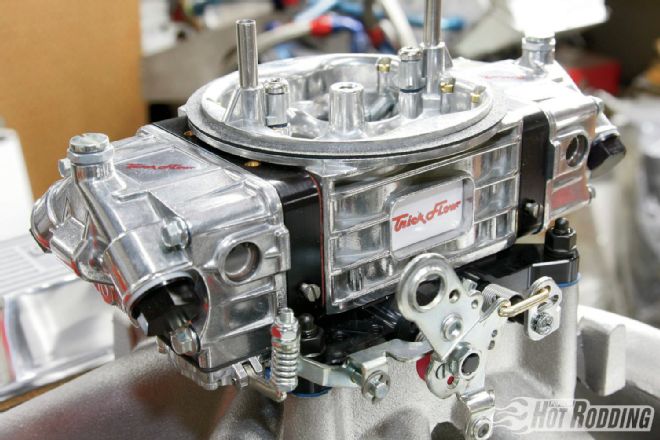 11. We’re really excited about testing Trick Flow’s new 850-cfm Track Heat Pro carb (TFS-20850R $676.20)! Starting with a Proform main body with downleg boosters, screw-in idle and high-speed air bleeds, and a blended venturi area, Trick Flow adds CNC-machined billet metering blocks with four-stage emulsion to provide more precise fuel metering, improved throttle response, and give a more uniform fuel performance curve.
11. We’re really excited about testing Trick Flow’s new 850-cfm Track Heat Pro carb (TFS-20850R $676.20)! Starting with a Proform main body with downleg boosters, screw-in idle and high-speed air bleeds, and a blended venturi area, Trick Flow adds CNC-machined billet metering blocks with four-stage emulsion to provide more precise fuel metering, improved throttle response, and give a more uniform fuel performance curve.
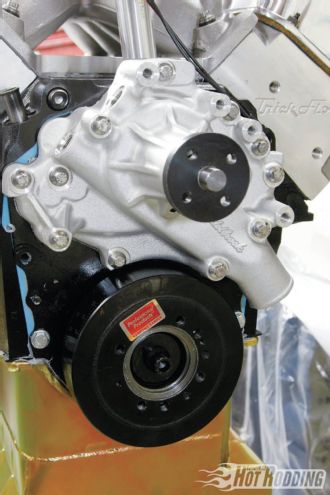 12. For cooling, we kept it simple and stock-pulley friendly with an Edelbrock aluminum water pump (EDL-8844, $209.97). Harmonics are handled by a Professional Products damper, both from Summit Racing. We’ll clean up the stock crank and water pump pulleys for the dyno test.
12. For cooling, we kept it simple and stock-pulley friendly with an Edelbrock aluminum water pump (EDL-8844, $209.97). Harmonics are handled by a Professional Products damper, both from Summit Racing. We’ll clean up the stock crank and water pump pulleys for the dyno test.
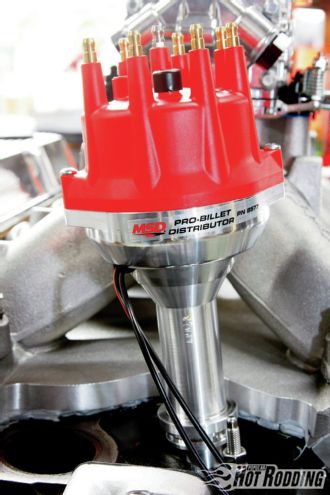 13. We believe in the precision of modern spark distribution, and MSD makes the Pro-Billet—one of our favorites—for both quality and reliability (MSD8577, $255.97).
13. We believe in the precision of modern spark distribution, and MSD makes the Pro-Billet—one of our favorites—for both quality and reliability (MSD8577, $255.97).
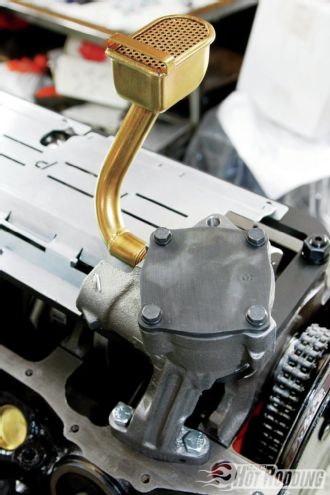 14. Time to talk about oiling! The Trick Flow heads improve oil flow and drainback, but to get it moving we used a Melling high-volume pump from Summit Racing (MEL-M84AHV, $52.97). The pickup, however, is an extended piece from Milodon.
14. Time to talk about oiling! The Trick Flow heads improve oil flow and drainback, but to get it moving we used a Melling high-volume pump from Summit Racing (MEL-M84AHV, $52.97). The pickup, however, is an extended piece from Milodon.
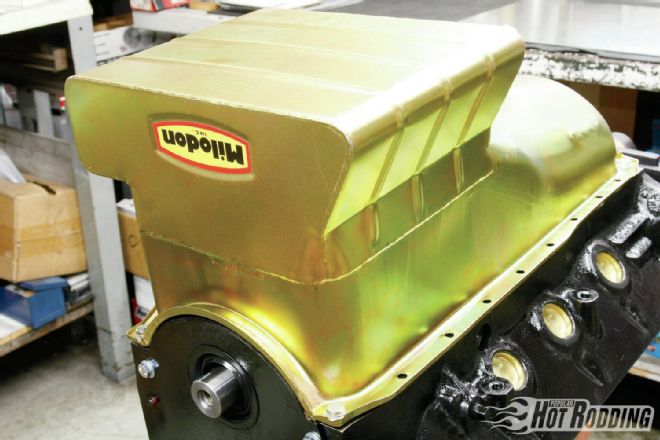 15. That extra pickup length is needed to plumb the depths of our Milodon street and strip oil pan (MIL-30927, $269.97). Designed for performance street as well as dragstrip applications, the deep-sump, but low-profile design fits most pre-’73 stock chassis and steering, as well as most headers in original 351C-equipped cars. The internal baffling controls oil and frees up additional power, especially with high-volume oil pumps and at higher-rpm ranges.
15. That extra pickup length is needed to plumb the depths of our Milodon street and strip oil pan (MIL-30927, $269.97). Designed for performance street as well as dragstrip applications, the deep-sump, but low-profile design fits most pre-’73 stock chassis and steering, as well as most headers in original 351C-equipped cars. The internal baffling controls oil and frees up additional power, especially with high-volume oil pumps and at higher-rpm ranges.
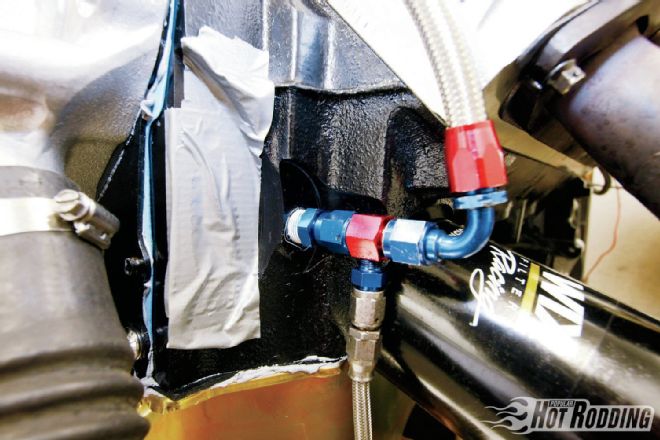 16. This is the pickup point for the notorious Cleveland external oiling mod. In reality, the stock oiling system is totally adequate for hot street use and even occasional drag racing. This mod is a good idea, however, for engines that will run at sustained high rpm. For extra security, we’re also running COMP Cams own 10W30 Muscle Car & Street Rod oil.
16. This is the pickup point for the notorious Cleveland external oiling mod. In reality, the stock oiling system is totally adequate for hot street use and even occasional drag racing. This mod is a good idea, however, for engines that will run at sustained high rpm. For extra security, we’re also running COMP Cams own 10W30 Muscle Car & Street Rod oil.
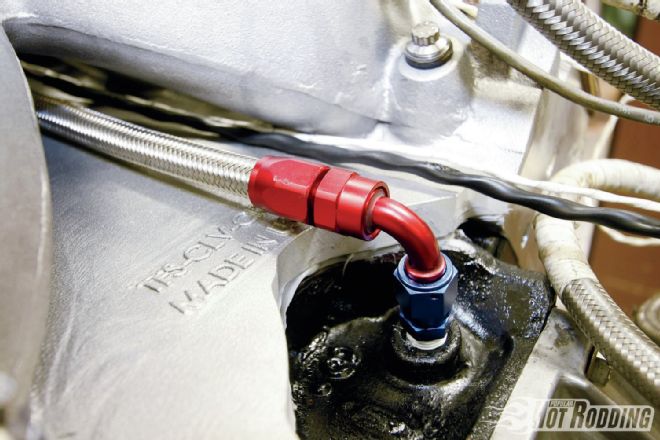 17. The oil line is routed directly back to a port at the rear of the block that will bathe the rear main and cam bearing in additional oil. Also note the “Made In USA” embossed on the TFS intake. We just love pointing that out when we see it on parts.
17. The oil line is routed directly back to a port at the rear of the block that will bathe the rear main and cam bearing in additional oil. Also note the “Made In USA” embossed on the TFS intake. We just love pointing that out when we see it on parts.
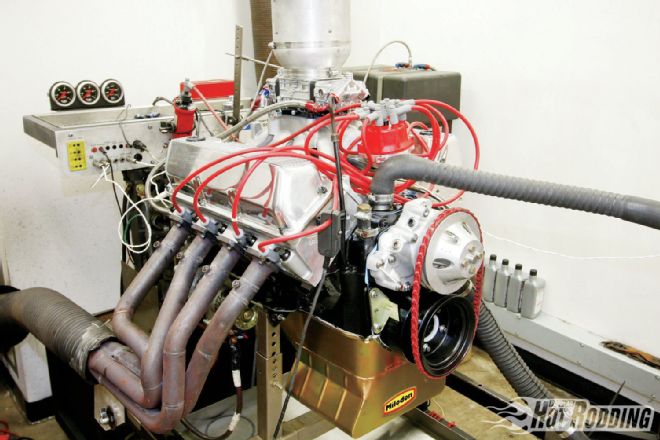 18. Allen Bessant at Bessant Engineering Products in Anaheim, California, handled our dyno testing on his SuperFlow SF-901. Allen is an ex-Pro Stock racer, he has decades of dyno experience, and he’s a friendly guy in general. We highly recommend him for engine building or testing. In hindsight, Bessant would rather have used 1⅞-inch headers for testing instead of these 1¾-inch units, but sometimes you have to work with what is available.
18. Allen Bessant at Bessant Engineering Products in Anaheim, California, handled our dyno testing on his SuperFlow SF-901. Allen is an ex-Pro Stock racer, he has decades of dyno experience, and he’s a friendly guy in general. We highly recommend him for engine building or testing. In hindsight, Bessant would rather have used 1⅞-inch headers for testing instead of these 1¾-inch units, but sometimes you have to work with what is available.
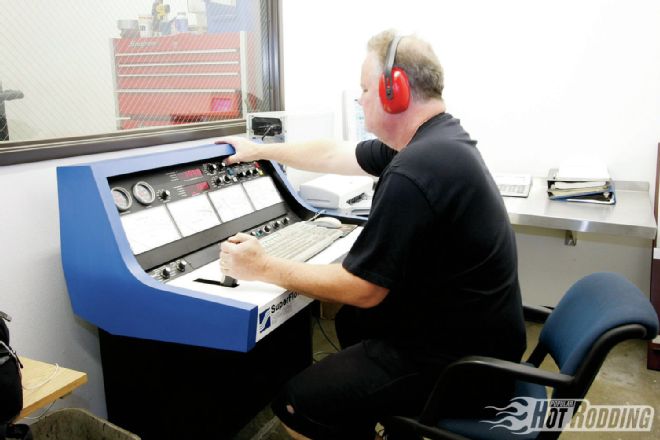 19. The horsepower curve was textbook perfect on every run, just shifting up or down depending on where we placed the timing. The torque curve was practically a flat line from 3,500 to 6,400 rpm, starting at 499, peaking at 523, and ending at 510. This thing would really get a muscle car moving!
19. The horsepower curve was textbook perfect on every run, just shifting up or down depending on where we placed the timing. The torque curve was practically a flat line from 3,500 to 6,400 rpm, starting at 499, peaking at 523, and ending at 510. This thing would really get a muscle car moving!
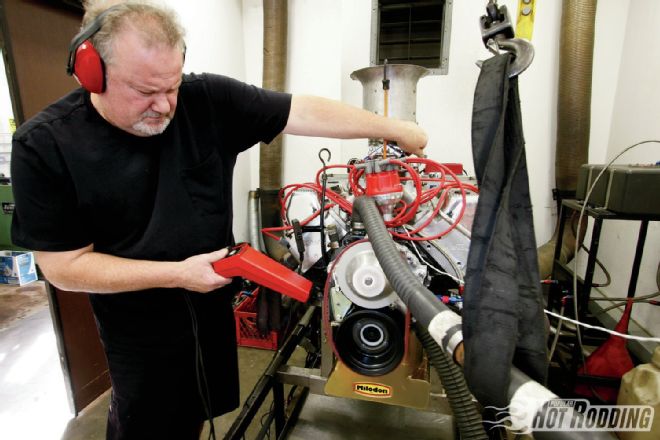 20. It never detonated, but we quickly determined that our Cleveland was supersensitive to timing changes on 91-octane pump fuel with as little as .5 degrees making a noticeable difference in the numbers. In the end, it was happiest with 27 degrees total. Amazingly, the new TFS carb was spot-on on for our testing and required absolutely no adjusting or jet changes to keep the air/fuel ratio in the 13.0 range through the pulls. That is literally the first time that has ever happened to us.
20. It never detonated, but we quickly determined that our Cleveland was supersensitive to timing changes on 91-octane pump fuel with as little as .5 degrees making a noticeable difference in the numbers. In the end, it was happiest with 27 degrees total. Amazingly, the new TFS carb was spot-on on for our testing and required absolutely no adjusting or jet changes to keep the air/fuel ratio in the 13.0 range through the pulls. That is literally the first time that has ever happened to us.